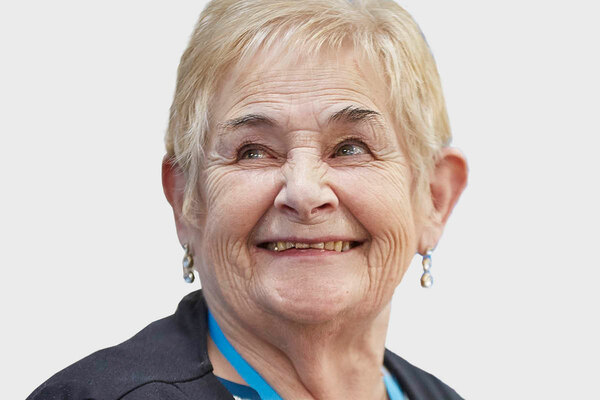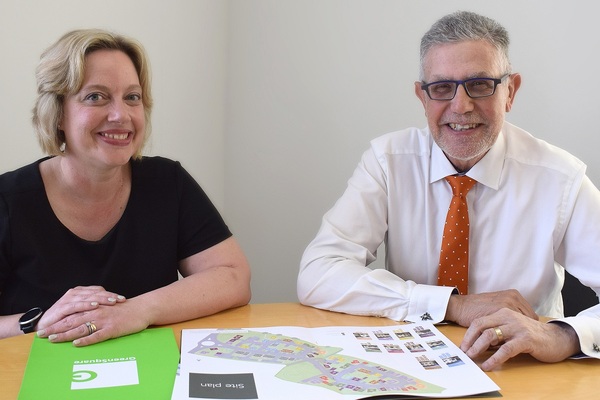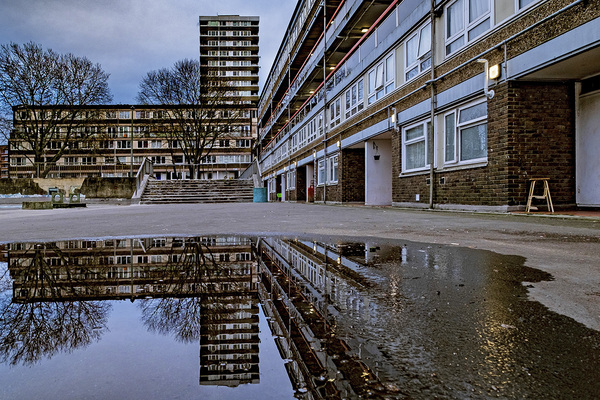You are viewing 1 of your 1 free articles
Tpas’ Jenny Osbourne: ‘If Grenfell hadn’t happened, we wouldn’t be talking to government’
As chief executive of Tpas, Jenny Osbourne is on the frontline of tenant engagement at a crucial time for the sector. Gavriel Hollander hears about the ups and downs of her five years at the helm. Photography by Simon Brandon
Jenny Osbourne is apparently a glass half full sort of person.
Inside Housing meets the chief executive of Tpas just six weeks after the organisation was one of the co-signatories of a letter to housing minister Kit Malthouse expressing tenant groups’ disappointment with the lack of progress from government over tenant engagement nearly two years after the Grenfell fire (see below).
Yet Ms Osbourne, one of the most important and high-profile voices in the sector when it comes to tenant engagement, is optimistic about the state of play.
“We’re in a really good place,” she insists as she settles into a meeting room at Inside Housing’s London office. “In terms of engagement being on the agenda, we’re on a high. People are talking about it, it’s being talked about politically, regulatory frameworks are changing. It’s about never letting it dip down, that profile.”
Ms Osbourne has worked at Tpas for 17 years – more than half the time the organisation has existed – and has been chief executive for the past five. She is familiar with how fickle the sector is when it comes to listening to tenants. An expressive speaker, she mimes a rollercoaster as she explains: “It’s no secret that Tpas goes up and down. It follows where the sector is going: when it’s doing loads with engagement, we’re on the up, [such as] when in the early days we were still getting grant from government to do projects. Things were good.”
The rent cut in 2015, though, was a big blow. “Just as that affected housing associations, it also had an impact on the organisations like Tpas that supply into the sector,” recalls Ms Osbourne. “We took a real hit on membership. We lost members because people weren’t prioritising engagement.”
So, what has changed? Ms Osbourne is typically unequivocal when answering: “I’m really clear about this: if Grenfell had not happened, we would not be having all of these conversations – I don’t know what world we’d be in now.”
In the immediate aftermath of the tragedy, Theresa May told the House of Commons that it “must recognise that for too long in our country, under governments of both colours, we simply haven’t given enough attention to social housing”.
Soon after, then-housing minister Alok Sharma embarked on a series of ‘roadshows’, heading off around the country with departmental staff to meet tenants to talk about social housing. At the time, Ms Osbourne wrote in Inside Housing that the meetings would have been “unthinkable” before Grenfell.
Nearly two years on, she still believes such a public display of engagement represents a turning point. “To have the minister come out and do the roadshow… that was unprecedented,” she says. “That isn’t something I’ve seen in 17 years at Tpas.
“If Grenfell had not happened, we would not be having all of these conversations”
“I think they heard things at those roadshows – not just ministers but civil servants – that they’d never heard before and I take that really positively. I think there is a genuine change in [government] recognising that you have to engage with people in a way that you haven’t done before. I think it’s genuine and they’ve put things in place to take things forward.”
One of those things that has been put in place is the Social Housing Green Paper, which finally emerged last September.
The green paper had a mixed response from the sector and, of course, we are waiting to see what the next steps will be.
Again, when it comes to the green paper, Ms Osbourne is determined to focus on the positives. “It asked some of the right questions,” she says when asked to rate the government’s proposals. “And I’ve never known tenants as engaged with something as they were with that.”
She is also positive that a new regulatory framework could be on the way with a stronger emphasis on the needs of tenants. She cites Shelter’s report earlier this year following its commission on social housing – which called on strengthened consumer regulation – as important in “focusing minds” on the problem.
“There have been times with previous ministers where the eyes glaze over”
However, she does no more than describe the green paper as “OK” as a response to the country’s housing problems. A flash of her downbeat humour comes through when Inside Housing asks what parts of it she is most excited about. “Let’s not get giddy here,” she smiles back.
Originally from Stockport, Ms Osbourne still lives in the town. She joined Tpas in 2002 having been on the Post Office’s graduate scheme. She admits that she wasn’t attracted to the job because of a passion for housing, but because she wanted to work in a smaller organisation. But the bug took hold. “Like most people in housing, you stay once you’re in,” she tells Inside Housing.
However, her passion for the sector now, nearly two decades on, is evident. And it is hard not to believe her when she talks about a change in timbre when it comes to relations with government. The main change – for Ms Osbourne and the tenants she works with – seems to be a feeling that ministers are listening. This compares favourably with regimes of the recent past, she explains.
“There have been times with previous ministers where the eyes glaze over,” she elaborates. “I’d be sitting in a room and there’s no understanding of why we’re even there. They feel the need to bring us round the table but they don’t understand what we do.”
So which of the dozen or so housing ministers that Ms Osbourne has dealt with in her time at Tpas is she referring to?
“I don’t think I want to go there – I think we can all work it out,” she answers. But her guardedness doesn’t last long.
“It’s not just building houses, it’s what you do when you build them”
“The whole thing with the TSA [Tenant Services Authority], all of that time was very difficult,” she says, referencing Grant Shapps’ infamous comment just months into his stint as housing minister in 2010 that the then-regulator was “toast”.
“We were hopeful when the TSA was established,” continues Ms Osbourne. “We saw it as a good thing, not just because we were part of it but because we made real progress. Tenants at that point felt hopeful and optimistic that things seem to be changing for them, and then the whole ‘toast’ stuff comes in and tenants think, ‘Oh, we just felt like we were getting somewhere and it gets ripped away from us again.’”
The scrapping of the TSA was the beginning of a difficult era for social housing tenants and groups, such as Tpas, that represent their interests, according to its chief executive: “It indicated to everyone that this isn’t important.”
She also believes that the environment at the time helped create a stigma around social housing tenants, which the green paper has explicitly said needs to be addressed.
“I have to lay the blame at the door of government policy,” she explains. “It just allowed the environment to build up that said, ‘Just be bloody grateful that you’ve got social housing.’
“‘Be grateful. Shut up. You’re work shy. You’re unemployed.’ All of that narrative was going on.”
Ms Osbourne says that this attitude meant that policy was directed almost exclusively at building more homes. And while she accepts that increasing supply can also help get rid of other problems, including the stigma attached to social renting, the focus on new build allowed some housing associations to drift away from their social purpose.
“It’s not just building houses, it’s what you do when you build them,” she emphasises. “You will have people in those homes, so you don’t just walk away. There were organisations that forgot that.
“That short-termism of reacting to a few years of very hostile government policy – that’s not what housing’s about; it’s a long-term thing. We got caught up for a fair few years running around and seeing what government wants to make us do. We forgot to tell our story.”
Given that Ms Osbourne knows how quickly the tide can turn in Westminster, you can see why her optimism is tinged with concern. The letter to Mr Malthouse came from steering group A Voice for Tenants, which had been working closely with the government since Grenfell and was instrumental in setting up the roadshows in 2017 and 2018. The group, which includes representatives from Tpas, effectively put its operations on hold.
In the letter it complained that there has “not been any significant progress in achieving the prime minister’s aim to bring the four million social housing tenants into the political process”, and said there had been “next to no dialogue” with government since the end of last year.
Ms Osbourne admits to some disappointment. “If we were a campaign that had been funded, then you can see an argument to wait a bit longer,” she says. “But there comes a point where you can’t keep having meetings and keep it bubbling with no resources and in your spare time.”
Speediness is important for other reasons, too. We meet Ms Osbourne in the very week that Ms May finally accepted the inevitable and announced her resignation. Her words about social housing in the days after Grenfell were a source of hope.
“We got caught up for a fair few years running around and seeing what government wanted us to do. We forgot to tell our story”
“We always quote Theresa May,” says Ms Osbourne. “When we had that first conversation [with government] we said, ‘Goodness me, we’ve got a prime minister saying this.’ This gives us hope. But when she goes, you can see how it could slip off the agenda, so time is of the essence.”
As for Ms Osbourne herself, she is in no hurry to slow down despite five turbulent years at the helm of Tpas.
She has just taken over as chair of Stockport Homes, and she thinks the different perspective that comes with a chairpersonship helps her do the day job rather than impinge on it. She also insists that she took the job because of her ties to her hometown, rather than as the start of a career on the non-executive merry-go-round.
She admits that she has thought about quitting but mainly because “a chief executive should only stay a certain amount of time”. However, as it stands, she sees her job as only half done: “These are interesting days for engagement and I want to see some of these things come through – I want to see how it all plays out over the next few years.”
And will she maintain her positive approach? Well, Ms Osbourne prefers to describe herself as “pragmatic”.
“I’m not Pollyannaish about it,” she sums up. “There’s just enough things at the moment that give me hope.”
A Voice for Tenants letter to the housing minister
Dear Minister
It is disappointing that, coming up to the two-year anniversary of the Grenfell tragedy, there has
not been any significant progress in achieving the prime minister’s aim to bring the four million social housing tenants into the political process.
We have asked Inside Housing to publish this letter because we as tenants consider that our input into the political process is sufficiently important to merit sector-wide debate.
We are writing to you again following our letter to you on 15 January, to invite you or your officers to a sectoral discussion to be hosted by Inside Housing on how best to develop national tenant representation.
We welcomed that your government agreed to our request to include a question about national tenant representation in the Social Housing Green Paper. We are sure that you will be delighted that in response to the government’s question, so many stakeholders in the sector have responded so positively that national tenant representation is needed.
We can confirm that this level of positive support for our proposals for national tenant representation is what we are experiencing also. As you know, a huge 93% of respondents to the survey we carried out (mostly from social housing tenants) said that there is a need for national tenant representation. Disappointingly, this was matched by a similarly huge 87% of respondents who considered that tenant voices are not currently heard in government policy discussions.
We are also pleased that all the major sectoral bodies support tenants’ views that there should
be national tenant representation, including Inside Housing, the National Housing Federation, the Association of Retained Council Housing, the National Federation of ALMOs, Shelter and Dame Judith Hackitt in her proposals about how to respond to the issues brought up by the Grenfell fire tragedy.
A Voice for Tenants Steering Group was formed in the wake of Grenfell, bringing together the national bodies that act on behalf of tenants alongside other tenants active nationally.
While our group consisted of the most nationally representative group of tenants at that time, we never purported to be representative of tenants. We have always made the case that it is not possible for any tenant group to speak on behalf of four million social housing tenants or achieve the prime minister’s aim to bring them into the political process without the means to have a two-way dialogue with them.
We approached then-housing minister Alok Sharma MP, offering to work with him constructively and coherently to start the process of building engagement with tenants. He responded positively to our approach and asked us both to draw up proposals for how dialogue with tenants could take place and to assist him in holding a set of ministerial events for him to meet with tenants. At that time, DCLG officers had no experience of working with tenants. It was as a result of our knowledge and experience and the tireless input of many of our volunteers that it was possible to hold a successful series of ministerial events. The minister and DCLG officers were surprised by the quality of tenant debate at those events, and they were a fantastic start to tenants and the government working in partnership together.
“We are disappointed that, despite the overwhelming support for the principles in our proposals, there has been next to no dialogue between government and our group since the end of 2018”
The Ministry broadly welcomed the proposals we had made to them at their request. Given the many different tenant viewpoints on how national tenant representation should be established, we have always proposed that A Voice for Tenants should be established through an extensive tenant-led national consultation with tenants. We saw this as a start to what would need to be a long-term means of building tenant involvement in the political process, which would need to include engagement with tenants in many different ways. The Ministry has asked us on many occasions to amend our proposals, which we have done, and the Ministry asked us to set out how national consultation should take place in our submission to the Social Housing Green Paper, which we also did.
We are disappointed that, despite the overwhelming support for the principles in our proposals, there has been next to no dialogue between government and our group since the end of 2018.
Time has moved on since we made our initial proposals to government in July 2017. More tenant groups are emerging, most of them with stronger views than ours that government should have taken action much sooner to redress power imbalances between tenants and landlords. We recognise that different proposals than ours may be appropriate now, and that we on the A Voice for Tenants Steering Group may not be the right people to take forward the national tenant representation debate on behalf of tenants. It is also the case that our group – which has had no financial resources – is now finding it hard to progress any further. Our last meeting had six people present in person, with a further nine people who could not afford train fares attending on the phone. Perhaps we were naïve, but we never anticipated that it would take nearly two years for any progress to be made and that there would
still be no resources to enable even our small group of tenants to debate issues.
The fundamental question remains regarding how the government and the sector are going to ensure that four million social housing tenants are going to be brought into the political process. If our proposals to government are not what is needed, then what is the government going to do to achieve the prime minister’s aim? How can the housing sector assist in this aim? We invite government and the sector to take part in a sectoral debate on this issue to be hosted by Inside Housing.
These are important issues within the fabric of our society. It is a fundamental democratic deficit that
the views of the eight million people living in the four million social housing tenanted homes are being ignored. Most social housing tenants feel totally disregarded and disrespected by politicians and their landlords alike. Unless we start to take steps to address their alienation and powerlessness, there will be long-term negative consequences for society as a result of it.
Yours faithfully
Leslie Channon, chair, A Voice for Tenants Steering Group















